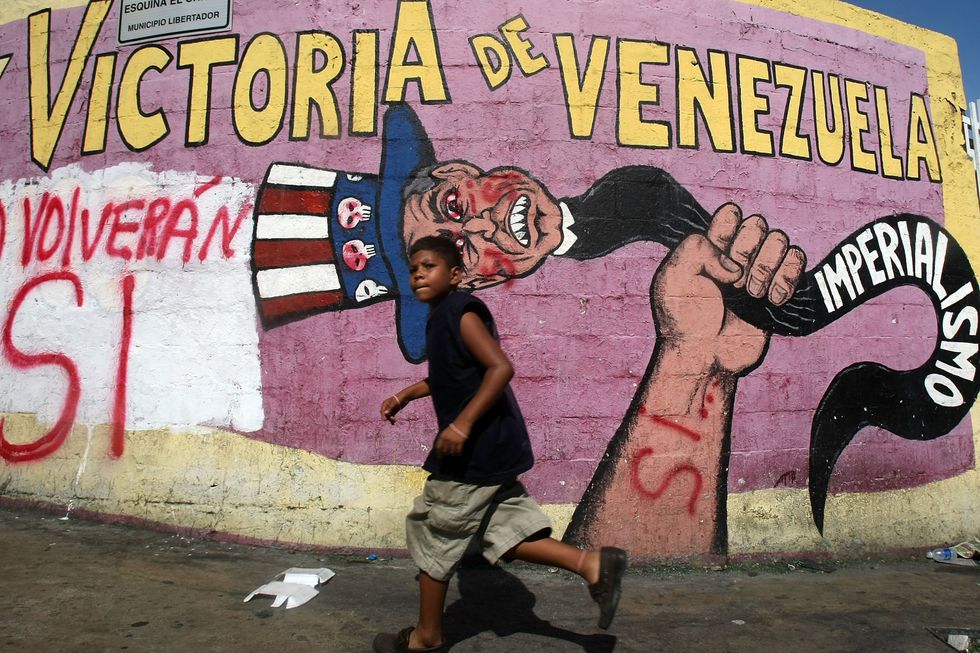Politics
Trump Authorizes CIA Operations in Venezuela, Sparking Concerns

President Donald Trump has authorized Central Intelligence Agency (CIA) operations aimed at toppling Venezuelan President Nicolás Maduro, raising alarms among foreign policy experts about the potential for another U.S. military intervention. This decision has prompted a bipartisan group of senators to introduce a resolution to block unauthorized military actions against the South American nation.
“Reports that the Trump administration has authorized covert efforts seeking to foment regime change in Venezuela are deeply concerning,” stated Matt Duss, executive vice president of the Center for International Policy, a Washington, D.C.-based think tank. He added that this authorization follows the administration’s previous use of military force in the Caribbean, which Duss characterized as extrajudicial killings.
During a press conference on October 16, 2025, Trump justified the CIA’s involvement, citing two primary reasons: the alleged release of prisoners into the United States and the influx of drugs originating from Venezuela. He claimed, “Number one, they have emptied their prisons into the United States of America. And the other thing, the drugs, we have a lot of drugs coming in from Venezuela.” However, experts have debunked the assertion regarding prisoners, highlighting a lack of credible evidence to support the claim.
When it comes to drug trafficking, while Venezuela is indeed a transit point for cocaine from neighboring Colombia, the majority of narcotics entering the United States come through other routes, particularly Mexico. The U.S. Drug Enforcement Administration has reported that approximately 90% of cocaine destined for the U.S. is trafficked via Mexico, with Venezuela not being a significant source of fentanyl, the leading cause of drug overdoses in the country.
Duss emphasized that using covert operations or military measures to destabilize regimes is reminiscent of past U.S. interventions in Latin America that have had detrimental effects on human rights and national sovereignty. He noted that the U.S. has engaged in at least 41 successful interventions to overthrow governments in the region since 1898, often leading to long-term instability.
The historical context of U.S. involvement in Venezuela dates back to the 19th century and includes various episodes of supporting dictators and undermining democratic movements. Recent administrations, beginning with George W. Bush, have sought to counter the Bolivarian Revolution initiated by former President Hugo Chávez and continued under Maduro. Under Trump, the U.S. has deployed naval forces and troops near Venezuela, actions that have sparked concerns of imperialistic tendencies.
Maduro responded to Trump’s announcement, asserting, “The CIA has been sent to Venezuela for regime change. Since its creation, no U.S. government has so openly ordered this agency to kill, overthrow, or destroy other countries.” He further claimed that the U.S. interest in Venezuela is driven by its natural resources, stating, “If Venezuela did not possess oil, gas, gold, fertile land, and water, the imperialists wouldn’t even look at our country.”
The consequences of U.S. economic sanctions on Venezuela have also raised serious humanitarian concerns. Research from the Center for Economic and Policy Research indicates that tens of thousands of Venezuelans have died due to these sanctions, complicating the narrative surrounding U.S. intervention.
In light of the potential for military action, a bipartisan group of senators, including Tim Kaine (D-Va.), Rand Paul (R-Ky.), and Adam Schiff (D-Calif.), introduced a war powers resolution aimed at preventing unauthorized military operations in Venezuela. Kaine expressed his concerns, stating, “I’m extremely troubled that the Trump administration is considering launching illegal military strikes inside Venezuela without specific authorization by Congress.” He emphasized that Americans do not wish to engage in further conflicts that could destabilize the region and lead to new waves of migration.
This current resolution marks the second attempt by Kaine and Schiff to introduce a measure to restrict military action in Venezuela. Earlier in the month, a similar resolution was defeated when Senator John Fetterman (D-Pa.) voted against it alongside some Republicans.
As discussions around U.S. intervention continue, experts urge caution, noting that military action often leads to unforeseen complications. Joseph Addington, a columnist for The American Conservative, highlighted the costs and risks associated with such interventions, stressing that the U.S. learned difficult lessons from its military engagements in the Middle East.
The growing unrest in Venezuela and the Trump administration’s moves have sparked significant debate about the future of American foreign policy in Latin America and the potential consequences of military action.
-

 Business1 week ago
Business1 week agoIconic Sand Dollar Social Club Listed for $3 Million in Folly Beach
-

 Health1 week ago
Health1 week agoPeptilogics Secures $78 Million to Combat Prosthetic Joint Infections
-

 Politics1 week ago
Politics1 week agoAfghan Refugee Detained by ICE After Asylum Hearing in New York
-

 Science1 week ago
Science1 week agoResearchers Achieve Fastest Genome Sequencing in Under Four Hours
-

 Lifestyle1 week ago
Lifestyle1 week agoJump for Good: San Clemente Pier Fundraiser Allows Legal Leaps
-

 Health1 week ago
Health1 week agoResearcher Uncovers Zika Virus Pathway to Placenta Using Nanotubes
-

 World1 week ago
World1 week agoUS Passport Ranks Drop Out of Top 10 for First Time Ever
-

 Entertainment1 week ago
Entertainment1 week agoJennifer Lopez Addresses A-Rod Split in Candid Interview
-

 World1 week ago
World1 week agoRegional Pilots’ Salaries Surge to Six Figures in 2025
-

 Top Stories6 days ago
Top Stories6 days agoChicago Symphony Orchestra Dazzles with Berlioz Under Mäkelä
-

 Science1 week ago
Science1 week agoMars Observed: Detailed Imaging Reveals Dust Avalanche Dynamics
-

 Business1 week ago
Business1 week agoMcEwen Inc. Secures Tartan Lake Gold Mine Through Acquisition









